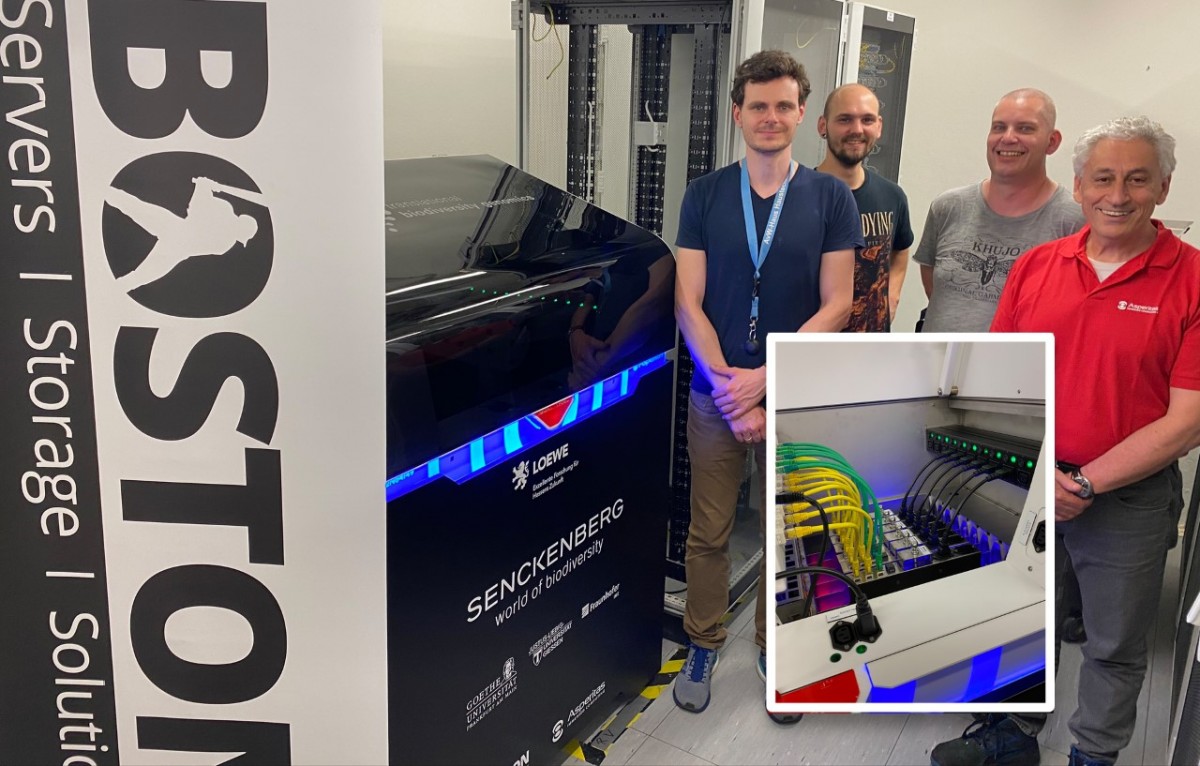The Senckenberg Society for Natural Research was founded in 1817 as the Senckenberg Natural Research Society. Today the company is one of the most important research institutions for all aspects of biological diversity. Together, with Goethe University, Frankfurt, the Justus Liebig University Gießen and the Fraunhofer Institute for Molecular Biology and Applied Ecology IME, the Senckenberg Society for Nature Research has set up a joint research centre. The LOEWE Centre for Translational Biodiversity Genomics (LOEWE‐TBG) began operating in January 2018.
Large amounts of data are processed there every day for research into the genomes of organisms. The aim is to make the global biodiversity visible on the genomic level and to contribute to preserving and protecting it. Resource‐saving data centre equipment is of particular importance to the Centre.
More computing power for biodiversity
Boston Server & Storage Solutions and the Dutch Cleantech company Asperitas, known for their immersion cooling technology, offer a platform for data and compute‐intensive applications with their jointly developed plug‐and‐play solutions. The solutions, based on the patented Immersed Computing® concept, are optimized for high IT‐packing density and have an extensive integrated memory.
In the LOEWE Centre for Translational Biodiversity Genomics, Immersed Computing® server solutions are used, which are based on the powerful processors of the AMD EPYC™ 7000 series as well as a system based on Intel® and NVIDIA®. The high‐density platforms, including customized heat sinks for higher performance, have been specially developed for operation in the Asperitas AIC24 immersion cooling solution.
"The LOEWE Centre was looking for a highly energy‐efficient, sustainable, reliable and maintainable solution to complement its research efforts," says Peter Uelen, CCO of Asperitas. “The system will support the existing IT infrastructure by meeting the ambitious HPC requirements for comparative genomics for hundreds and even thousands of species. Together with our partners, Boston and Shell (for the immersion cooling fluid), this system offers the most efficient solution on your own premises and supports the latest technologies with extremely low maintenance costs. Future extensions are possible with little effort."
For more sustainability
Immersion cooling doesn't just increase computing power. The higher IT‐packing density reduces the space required in the data centre. Compared to an average air‐cooled cloud data centre, the AIC24 achieves a density 5‐10 times higher. Raised floors and aisle separation schemes are also no longer required. LOEWE shows that HPC can be implemented on site without complex requirements on the facility. The coolant is a synthetic immersion cooling liquid specially developed by Shell and is available as a standard product for data centres globally.
The award‐winning Immersed Computing® technology also guarantees the highest possible
optimisation for the IT. Complete immersion cooling ensures that no oxygen gets to the components. This prevents oxidation. Possible thermal shocks are greatly reduced due to the high heat capacity of the liquid. Only minor temperature fluctuations occur in the system, which significantly reduces the stress on the microelectronics due to thermal expansion. The contained solutions are ideal for on-premise compute demands where the environment has not been designed to facilitate a data centre.
Boston Managing Director Georg Klauser proudly declares: “Together with Asperitas and Immersed Computing®, we are bringing a completely new perspective on the technology in the data centre. Both the environment and the balance sheet benefit from using this on-premise, high performance computing technology. We are pleased to have a solution that is interesting for not only universities and research institutions but also for many more industries such as emerging digital technology developers, industry 4.0 and logistics. At Boston, we believe we don't just have an ecological responsibility to the world. Above all, it is our corporate duty to sustainably meet the needs and technical requirements of our customers with our solutions."
"We are very pleased to have created a compact, energy‐efficient solution together with the Boston Group and Asperitas," added Vik Malyala, Senior Vice President at Supermicro. “The efforts of the Senckenberg Society for Natural Research can lead to a better understanding of thousands of species on earth. We are happy to be part of this effort. By using energy‐efficient and high‐performance solutions, there are no air conditioning costs. Together with the enormous computing density, this leads to an excellent ROI ‐ and faster research results."
Asperitas’ Immersed Computing® solutions do not require pumps for internal fluid movement due to the unique design of natural, convection‐driven circulation. This creates the advantage of warm water cooling also being possible at high ambient temperatures of up to 45 degrees Celsius. It also enables efficient use of the heat. No superfluous energy is used, and the system works completely silently. The Asperitas Immersed Computing® solution allows a sustained high utilisation of the processor power and enables up to 40 percent more CPU and GPU performance compared to air‐cooled solutions.
Christoph Sinai from the TBG Bioinformatics team is pleased that “in Boston they have found a reliable partner who has accompanied us competently and carefully throughout the entire process ‐ from planning to commissioning. It is still important to us to stay in contact with Boston for future expansions of our data centre. Our desire for an energy‐efficient system that meets our high-performance requirements and excellent service has been fully met. "
The LOEWE Centre for Translational Biodiversity Genomics (TBG) worked with the Senckenberg Society for Nature Research, the lead partner institution, to find a particularly energy‐efficient solution. “The environmentally friendly technology from Asperitas quickly convinced us,” continues Christoph Sinai. “Thanks to the very effective immersion cooling technology, our server systems can run permanently under full load ‐ an important prerequisite for working together with our scientists in the analysis of the complex data of the genomes, which often runs for days and nights and sometimes in parallel for different organisms and must not be interrupted. Thanks to the integrated monitoring and control options, we constantly have the performance curves in view and can be sure that we enable the scientists to generate their research data smoothly."




